What's Happening?
A significant political conflict is unfolding in Texas as Republican and Democratic lawmakers clash over a proposed redistricting plan. The Texas House of Representatives has failed to meet quorum for the third time, preventing a vote on new Congressional maps that would potentially increase Republican seats by five. In response, many Democratic lawmakers have left the state, seeking support from Democratic governors in other states to counteract the redistricting efforts. Texas Attorney General Ken Paxton has filed lawsuits to remove several Democratic lawmakers from office, accusing them of dereliction of duty. The situation has escalated with civil arrest warrants issued for absent Democrats, and efforts to locate them have involved the Texas Department of Public Safety and the FBI.
Why It's Important?
The redistricting battle in Texas holds significant implications for the balance of power in Congress, potentially affecting national politics. If successful, the Republican-led redistricting could shift several seats from Democratic to Republican control, impacting legislative priorities and policy decisions. The standoff highlights the contentious nature of redistricting, often seen as a tool for political advantage. The actions taken by Texas Democrats to break quorum underscore the high stakes involved and the lengths to which lawmakers will go to protect their party's interests. This conflict may set a precedent for similar disputes in other states, influencing future redistricting efforts and political strategies.
What's Next?
The Texas Supreme Court is expected to address the lawsuits filed by Attorney General Paxton, which could lead to significant legal and political consequences. The ongoing search for absent Democratic lawmakers may result in further legal actions or negotiations to resolve the standoff. As the situation develops, both parties are likely to continue their efforts to sway public opinion and garner support for their respective positions. The outcome of this conflict could influence redistricting strategies in other states, potentially affecting the national political landscape ahead of upcoming elections.
Beyond the Headlines
The ethical and legal dimensions of the Texas redistricting standoff raise questions about the use of political power and the integrity of democratic processes. The aggressive tactics employed by both parties reflect broader concerns about gerrymandering and its impact on fair representation. This situation may prompt discussions on the need for reform in redistricting practices to ensure equitable representation and prevent manipulation for partisan gain. Additionally, the involvement of law enforcement agencies in political disputes highlights the intersection of legal authority and political strategy, potentially influencing public trust in governmental institutions.











